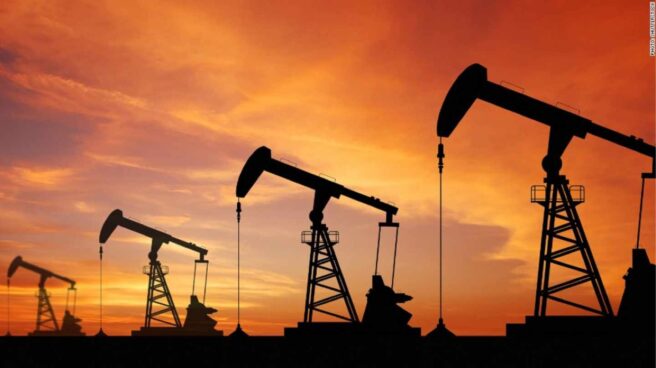

Towers for oil production.
The Organization of the Petroleum Exporting Countries (OPEC) is not opposed to phasing out fossil fuels, but is opposed to setting a specific date as it believes it is “unrealistic” as demand will continue to rise until at least 2045, they say. Sources familiar with their position at COP28 told EFE today.
“Demand continues to grow, ask the countries that buy oil why. We don’t tell them to buy, we don’t force them, we just fulfill their orders,” the same source said in a conversation about the arguments that OPEC brings to the World Climate Change negotiations. summit in Dubai (COP28)
In this sense, they referred to the ups and downs of the European Union (EU) when it came to agreeing on a date to end the use of internal combustion engine vehicles.
According to the projections they use, demand for oil will only begin to fall in 2045, and they stressed that not only does it have energy applications, but it is also very important for the petrochemical industry, which feeds pharmaceuticals, for example, and whose needs continue to grow.
OPEC letter
However, they confirmed the authenticity of the letter, published in various media and whose circulation has cast a shadow over negotiations with countries that, like those in the EU-led bloc, favor leaving COP28 with a “clear and dated” agreement to usher in the end of the fossil fuel era. In the letter, OPEC Secretary-General Haitham al-Ghais “respectfully” calls on OPEC and OPEC+ countries to “actively reject any text or formula that targets energy, that is, fossil fuels” rather than emissions.
“It appears that the undue and disproportionate pressure on fossil fuels may be reaching a tipping point with irreversible consequences, as the draft decision still contains options for their elimination,” the letter adds, referring to the draft Global Balance, which is considering several options at the end stage. coal, oil and gas.
Given that OPEC and OPEC+ countries take climate change “seriously” and “have demonstrated that they have a proven track record of climate action, it would be unacceptable for politically motivated campaigns to jeopardize the future and prosperity of our people.” document.
Following the publication of the letter, Spain’s Minister of Ecological Transition and voice at the COP28 EU Presidency, Teresa Ribera, called the move “disgusting”.
79.5% of proven oil reserves
OPEC, created in the 1960s, includes thirteen of the world’s largest oil-producing countries: Saudi Arabia, Algeria, Angola, Congo, United Arab Emirates, Equatorial Guinea, Gabon, Iran, Iraq, Kuwait, Libya, Nigeria and Venezuela.
According to OPEC’s website, from 1993 to 2022 these countries produced 108.7 billion barrels of oil equivalent, equivalent to 40.4% of global production.
According to the same source, it is estimated that 79.5% (124,352,000 million barrels) of the world’s proven oil reserves are located in OPEC member countries, most of which are in the Middle East.
The OPEC+ alliance brings together OPEC members and ten other countries (Azerbaijan, Bahrain, Brunei, Kazakhstan, Malaysia, Mexico, Oman, Russia, Sudan and South Sudan), which Brazil is expected to join.
Source: El Independiente